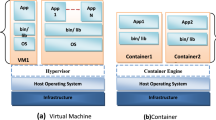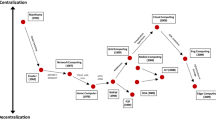Abstract
A scalable model and methods of resource co-allocation to organize data processing in distributed systems by families of basic plans—strategies—are proposed. The character of strategies is multilevel since they are designed for structurally different but functionally equivalent models of the same job which is a complex set of interrelated tasks. A concrete basic plan of computations is selected depending on time parameters of control events that occur in the system and are related first of all to the load and dynamics of the composition of heterogeneous computational nodes.
Similar content being viewed by others
References
Computer and Job/Shop Scheduling Theory, Coffman, E.G., Ed., New York: Wiley, 1976. Translated under the title Teoriya raspisanii i vychislitel’nye mashiny, Moscow: Nauka, 1984.
Mikhalevich, V.S. and Kuksa, A.I., Metody posledovatel’noi optimizatsii v diskretnykh setevykh zadachakh optimal’nogo raspredeleniya resursov (Sequential Optimization Methods in Optimal Discrete Network Resource Distribution Problems), Moscow: Nauka, 1983.
Casavant, T.L. and Kuhl, J.G., A Taxonomy of Scheduling in General-Purpose Distributed Computing Systems, IEEE Trans. Software Eng., 1988, vol. 14, no. 2, pp. 141–154.
Toporkov, V.V., Modeli raspredelennykh vychislenii (Models of Distributed Computations), Moscow: Fizmatlit, 2004.
Toporkov, V.V., Simultaneous Scheduling and Assignement of Processes as a Method of Optimization for Architectural Solutions of Computer Systems, Avtom. Telemekh., 2001, no. 12, pp. 107–116.
Toporkov, V.V. and Toporkova, A.S., Optimization of Characteristics of Computational Processes in Scalable Resources, Avtom. Telemekh., 2002, no. 7, pp. 149–157.
Toporkov, V.V., Resolution of Process Collisions in Scalable Computer Systems, Avtom. Telemekh., 2003, no. 5, pp. 180–189.
Toporkov, V.V., Composition and Distribution of Resources for Real-Time Computing Systems, Avtom. Telemekh., 2005, no. 1, pp. 171–189.
Czajkowski, K., Foster, I., and Kesselman, C., Resource Co-allocation in Computational Grids, Proc. 8th IEEE Int. Sympos. High-Performance Distributed Computing (HPDC-8), 1999, pp. 219–228.
Kovalenko, V.N. and Koryagin, D.A., Organization of Grid Resources, Preprint of Keldysh Inst. of Appl. Math., Russ. Acad. Sci., 2004, no. 63.
Natrajan, A., Humphrey, M.A., and Grimshaw, A.S., Grid Resource Management in Legion, in Grid Resource Management. State of the Art and Future Trends, Nabrzyski, J., Schopf, J.M., and Weglarz, J., Eds., Norwell: Academic, 2003, pp. 145–160.
Kurowski, K., Nabrzyski, J., Oleksiak, A., et al., Multicriteria Aspects of Grid Resource Management, in Grid Resource Management. State of the Art and Future Trends, Nabrzyski, J., Schopf, J.M., and Weglarz, J., Eds., Norwell: Academic, 2003, pp. 271–293.
Yang, L., Schopf, J.M., and Foster, I., Conservative Scheduling: Using Predicted Variance to Improve Scheduling Decisions in Dynamic Environments, Supercomputing, 2003 (http://www.globus.org/alliance/publications/papers).
Ranganathan, K. and Foster, I., Decoupling Computation and Data Scheduling in Distributed Data-intensive Applications, Proc. 11th IEEE Int. Sympos. on High Performance Distributed Computing, Edinburgh, 2002 (http://www.globus.org/research/papers/).
Kiselev, A., Korneev, V., Semenov, D., et al., Control of Metacomputer Systems, Otkrytye Sist., 2005, no. 2, pp. 11–16.
Enaliev, A.M., Ignatushchenko, V.V., Pomazov, E.V., et al., Methods of Mathematical Forecasting of the Time of Execution of Complex Sets of Jobs in Parallel Distributed Computer Systems, Avtom. Telemekh., 2002, no. 10, pp. 154–176.
Toporkov, V.V., Realizability of Distributed Program Flow Models, Programmirovanie, 2001, no. 5, pp. 18–25.
Toporkov, V.V., Solvability of Analysis Problems in Program Flow Models, Programmirovanie, 2003, no. 3, pp. 3–14.
Barskii, A.B., Parallel’nye protsessy v vychislitel’nykh sistemakh. Planirovanie i organizatsiya (Parallel Processes in Computer Systems. Planning and Organization), Moscow: Radio i Svyaz’, 1990.
Golovkin, B.A., Raschet kharakteristik i planirovanie parallel’nykh vychislitel’nykh protsessov (Computation of Characteristics and Scheduling of Parallel Computer Processes), Moscow: Radio i Svyaz’, 1983.
Toporkov, V.V. and Toporkova, A.S., Measurement of Fragmented Programs Running Time, Program-mirovanie, 2005, no. 3, pp. 19–32.
Toporkov, V.V., Toporkova, A.S., and Bogdanov, D.V., Direct Measurement of Program Running Time on RISC Processors, Inform. Tekhn., 2002, no. 10, pp. 2–8.
Yudin, D.B., Vychislitel’nye metody teorii prinyatiya reshenii (Computer-aided Decision Making Methods), Moscow: Nauka, 1980.
Author information
Authors and Affiliations
Additional information
Original Russian Text © V.V. Toporkov, 2007, published in Avtomatika i Telemekhanika, 2007, No. 12, pp. 131–146.
This work was supported by the Russian Foundation for Basic Research, projects nos. 04-01-00072 and 06-01-00027.
Rights and permissions
About this article
Cite this article
Toporkov, V.V. Multilevel strategies of resource co-allocation in distributed computations with control periods. Autom Remote Control 68, 2214–2227 (2007). https://doi.org/10.1134/S0005117907120090
Received:
Issue Date:
DOI: https://doi.org/10.1134/S0005117907120090




